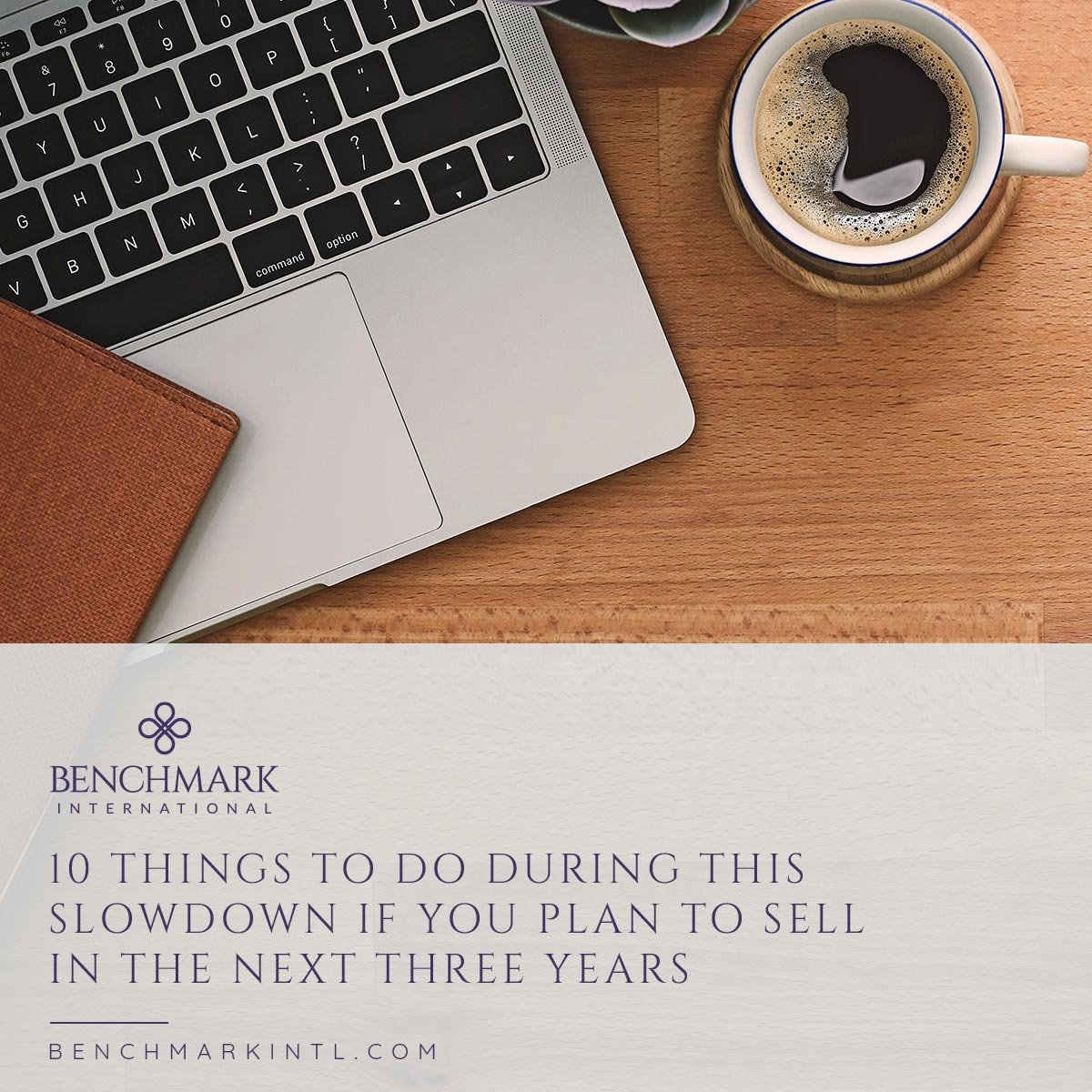
The explosion of the tech bubble, popping of the telecom bubble, 9/11, the financial crisis, now this. One of the benefits of working on mergers and acquisitions through unfortunate times is that you gain a good perspective on what lies ahead after the crisis passes. More specifically, you learn how acquirers will react and this in turn teaches you how to minimize the damage during the crisis. Every crisis is different but with four or five now under the belts of our senior staff, Benchmark International has been able to identify the acquirer behaviors almost certain to appear after this – and the next, and every other – dip in the inevitable rise of the middle markets.
To be clear, the dip here is not one of buyer interest or even multiples being offered to this point. As we near the fourth quarter, we continue to close deals, sign letters of intent, and bring clients to market. Please see our earlier post “What is Covid-19 Doing To The M&A Markets Now?” which continues to accurately describe the conditions we are seeing. What we mean by “dip” is the likely drop in your company’s revenue and all the other financial metrics that influences - and to some degree controls.
It is no secret that acquirers’ primary tool for determining their interest in, and their valuation of, a business is its financial performance. Businesses with growing revenue, healthy margins, and consistent performance sell for the highest multiples.
The situation we now face likely threatens all three of these characteristics and if your business has otherwise had a stellar historical performance concerning these three metrics, you may be extremely concerned that its performance during this period of the global slowing will forever mark its luster and lower its sale price.
While it is true that recapturing lost growth (i.e., growth that is not occurring at the moment) is hard to do, this is distinct from the real issues here – preserving the high multiple your business deserves. Fortunately, our experience indicates that your deserved multiple is salvageable – if you know how to do it. Yes, getting those record-high multiples for businesses at the end of the company sale process will be more complicated for the next few years, just as it was in 2009- 2012, but with the right preparation now and process later, you should have no reason to believe your multiple will be subpar in the future just because of the current financial setbacks.
Here are some key things to do and remember:
1) Your 2020 numbers will be with you for a long time. Acquirers most often claim to be valuing a business off of its last financial years’ performance or its “trailing 12-months” performance. In reality, they look back further. The standard practice for some is three years and for others it is five years. What we see coming out of downturns is that acquirers will keep looking at that period for many years to come. We are still seeing acquirers frequently asking for data back to 2007 in some cases. They want to see what happens to the business “when the wheels come off.” More technically, they are employing the financial theory called “Value at Risk”. They want to know the minimum value their investment might drop to in that business. The years 2007- 2009 used to be viewed as the logical provider of that data. Depending on how long the current crisis lasts, we may be done with that data set. The takeaway? No matter when you want to sell your business in the next 12 years, acquirers are going to ask for your 2020 numbers; you won’t be able to run from them. While that might sound like bad news, it is not. First of all, you are reading this article so you know this fact, and the owners you will be competing against when you go to sell will not. Secondly, you are going to prepare, based on this article, to turn that lemon into lemonade. Lastly, it is good for all of us because we can finally stop going back to 2007!
2) Volatility drives the mergers and acquisitions markets. M&A slows when the economy and political scene are in a steady state. Volatility – like a slowdown followed by an acceleration – brings buyers to the market. You could think of the M&A markets as toilet paper in this regard. When people (in this case big businesses and private equity funds) don’t know where volatility will take them, they rush decisions and flood the market. Therefore, there will be a window in any crisis where a move down in the economy aids sellers and a move up also aids them. The trick is to be ready. If you don’t prepare now, you won’t be ready to catch either of these two waves in the current situation. So, if you want to benefit from the volatility that now surrounds us - prepare now, get market-ready, and get to market if you can.
3) 2019 will carry extra weight. In the immediate aftermath of a downturn that acquirers view as (a) a once in a lifetime event and/or (b) something that has not changed the target industry fundamentally, there is a short period of time when they will base their deals on the pre-downturn figures, as they view those as more representative of the future performance of the company. There
will be a window during which, even though they are too stale under normal circumstances, the calendar year 2019 numbers will be considered the “trailing 12 months”. At present this is still the case, but as the third quarter unfolds, acquirers would typically start asking for Q2 numbers as the base for their offers. So, we have another few months for which CY2019 numbers maintain their standard shelf life. The length of their extraordinary life is yet to be seen, but it could potentially stretch into 2021.
4) Document, document, document. When building your pro forma financial statements to launch the company sale process, almost every business has some “addbacks,” even in the best of times. These are either discretionary expenses of the current owners that the future owners are not likely to incur or one-time expenses that are not likely to repeat themselves. Our experience in selling thousands of businesses with addbacks is that the quality of the documentation of the addbacks plays a large role in the acquirer’s decision to accept or reject them. Suggested procedures to put in place now include:
a. Start a separate file and note any expenses you are incurring that would not have been incurred in the absence of this situation. Keep it running for the duration. Revisit it every workday.
b. Before closing your quarterly books, speak with your accountant or internal accounting team about creating special line items in your company’s general ledger so that the extraordinary costs are booked as separate line items. This will be very impressive to acquirers when the time comes and greatly facilitate a smooth diligence procedure.
c. Keep extra-precise receipts for these items. Addbacks tend to be scrutinized more thoroughly than normal expenses so having an organized file of the source material for these expenses will be time well spent.
d. Don’t forget any loss of revenue your business might suffer. Document these instances as thoroughly as the extra expenses.
e. Start separate folders for each item of revenue impacted by the situation and store all data that could be used to establish that the loss was due to the external situation, not the actual relationship with the client or any additional occurrence that is likely to repeat itself and its impact.
f. If your organization is large enough, appoint someone to be responsible for keeping track of all negative financial impacts. This will be useful not only for the sale process but also potentially for collecting government disaster funds.
g. When in doubt about the value of any thought, document, or conversation, record it in that separate file and save it until you start your sale process. You would be surprised at what may not be important to one buyer but is to another so don’t try to guess. A good rule of thumb – anything happening that you feel is unfair, that catches you by surprise,
or that makes you mad at the government or people that don’t follow government guidance, goes either in this general file or in one of the more specific files.
5) Always act in the long-term interest of the business.
We tell business owners the same thing in all market situations – run your business to achieve the best operational results, not to make it look better for a sale. This is true for several reasons. One, what one buyer sees as a valuable improvement, another does not. Secondly, like renovating a house, you rarely get more out of upgrading the kitchen than you put into it so build the kitchen you want and need, not what you think the market wants. Thirdly, buyers can smell window dressing and don’t like it. Finally, buyers like “low hanging fruit” a couple of things they can dress up after taking over. If you take all the low hanging fruit, many buyers lose excitement. And this is even more true in the current situation as it proves very tempting to think in the short- term rather than the long-term. Many businesses will face exigencies that will mandate a shift from long to short term, but if you can avoid reaching that point, try to do so. Not only will staying focused on the long-term make your business more valuable regardless of a sale, but your ability to have weathered the storm without restructuring will impress buyers. To the extent you must think short-term, so only because it’s what’s good for the business not because you think it would be good for a sale.
6) Create a list of lessons learned. If you want to know how physically fit you are, run a marathon. If you want to know how good your business is, operate in Q3 2020. This is a stress test. You have a unique opportunity to learn things about your business. Weaknesses and threats will be revealed. They will be revealed not only to you but also to any acquirer that comes along in the next, dare I say – 12 – years. For now, keep a log of the lessons you learn and of the new concerns that arise. When brighter days return, get on with making the repairs. Even if you go to market before getting the repairs done, you will be credited for having spotted the weaknesses and at least come up with fixes. If you lack the time or funds to put the fixes in place, you can at least budget them for acquirers so that they do not let their imaginations run wild with irrational costs. A business owner that is smarter about their business, willing to admit weaknesses, and has or is prepared to address those weaknesses adds a lot of value to the business in the eyes of most buyers.
7) Maintain your relationships. Simply put, you will receive credit for what negatives happen during this anomaly if you follow the advice in this article; but under no circumstances will you receive credit from buyers for relationships you burned and cannot get back in place when normalcy returns. Don’t destroy any relationships now that could make the business more valuable in the future. If times get tough for you in the short-term it will be tempting to cut someone off sooner rather than later or to do so without the proper preparation and empathy. Think carefully about how your cost-cutting now may affect your revenue-generating in the future.
8) Catalog the changes you see happening and coming to your industry. What has this crisis caused? Are the weaker players falling out of your market? Are your customers consolidating? Has online become more important? Will the global supply chain shorten? If you own a successful business, you are an expert in your industry. You are in the perfect place to make very intelligent observations as long as you keep your head up and analyze what you see. This will both position your company for more success afterward and impress buyers, making it a win-win effort.
9) Consider labor opportunities. To grow your business when this is over, you will undoubtably need more labor. We went into this with very tight labor markets, in some countries the tightest labor markets in recorded history. While you may have too much labor for the time being, there are and will be opportunities to upgrade and expand your labor base. Some of your competitors may fold up creating extraordinary opportunities to capture great talent. Some of them may not treat their employees well. Do what you can now to be the destination of choice down the road for those workers on the move.
10) Look for new customers. Customer concentration is always a key concern for buyers. “Concentration” can mean the obvious – large customers – but it also has more subtle meanings such as concentration in one geographic area, in one industry, in one size of business, in one product or service. Be on the lookout for ways to branch out, without taking on unacceptable risk, as things change over the span of this slump. A more diversified customer base can compensate for that revenue you never got to earn during this period.
 Author
Author
Clinton Johnston
Managing Director
Benchmark International
T: +1 813 898 2350
E: Johnston@benchmarkintl.com
Americas: Sam Smoot at +1 (813) 898 2350 / Smoot@BenchmarkIntl.com
Europe: Michael Lawrie at +44 (0) 161 359 4400 / Enquiries@BenchmarkIntl.com
Africa: Anthony McCardle at +27 21 300 2055 / McCardle@BenchmarkIntl.com
ABOUT BENCHMARK INTERNATIONAL
Benchmark International’s global offices provide business owners in the middle market and lower middle market with creative, value-maximizing solutions for growing and exiting their businesses. To date, Benchmark International has handled engagements in excess of $6B across various industries worldwide. With decades of global M&A experience, Benchmark International’s deal teams, working from offices across the world, have assisted hundreds of owners with achieving their personal objectives and ensuring the continued growth of their businesses.
Website: http://www.benchmarkintl.com
Blog: http://blog.benchmarkcorporate.com
 Benchmark International
Benchmark International  Benchmark International
Benchmark International 






